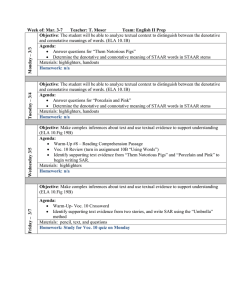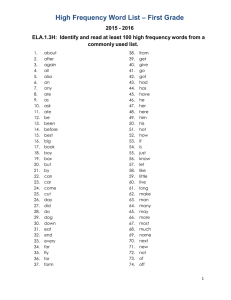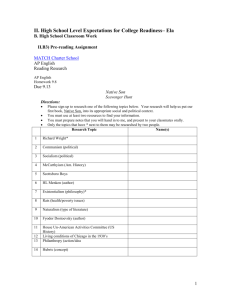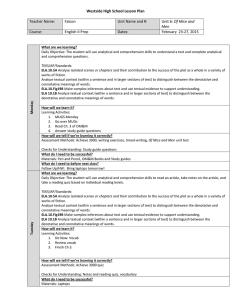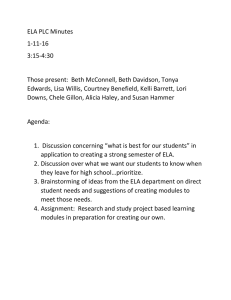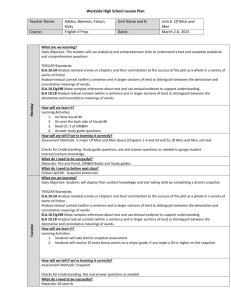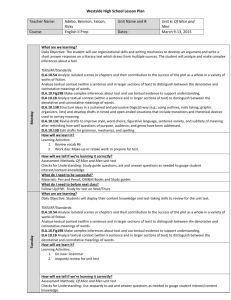Teacher Name: Falcon Unit Name and #:
advertisement
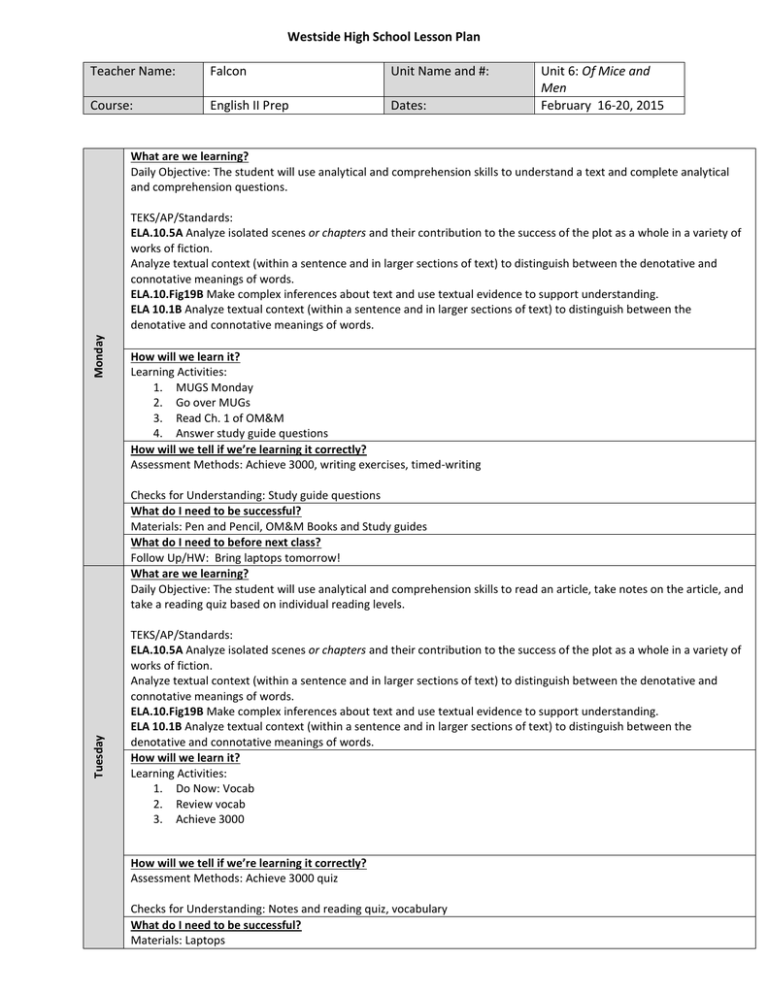
Westside High School Lesson Plan Teacher Name: Falcon Unit Name and #: Course: English II Prep Dates: Unit 6: Of Mice and Men February 16-20, 2015 What are we learning? Daily Objective: The student will use analytical and comprehension skills to understand a text and complete analytical and comprehension questions. Monday TEKS/AP/Standards: ELA.10.5A Analyze isolated scenes or chapters and their contribution to the success of the plot as a whole in a variety of works of fiction. Analyze textual context (within a sentence and in larger sections of text) to distinguish between the denotative and connotative meanings of words. ELA.10.Fig19B Make complex inferences about text and use textual evidence to support understanding. ELA 10.1B Analyze textual context (within a sentence and in larger sections of text) to distinguish between the denotative and connotative meanings of words. How will we learn it? Learning Activities: 1. MUGS Monday 2. Go over MUGs 3. Read Ch. 1 of OM&M 4. Answer study guide questions How will we tell if we’re learning it correctly? Assessment Methods: Achieve 3000, writing exercises, timed-writing Tuesday Checks for Understanding: Study guide questions What do I need to be successful? Materials: Pen and Pencil, OM&M Books and Study guides What do I need to before next class? Follow Up/HW: Bring laptops tomorrow! What are we learning? Daily Objective: The student will use analytical and comprehension skills to read an article, take notes on the article, and take a reading quiz based on individual reading levels. TEKS/AP/Standards: ELA.10.5A Analyze isolated scenes or chapters and their contribution to the success of the plot as a whole in a variety of works of fiction. Analyze textual context (within a sentence and in larger sections of text) to distinguish between the denotative and connotative meanings of words. ELA.10.Fig19B Make complex inferences about text and use textual evidence to support understanding. ELA 10.1B Analyze textual context (within a sentence and in larger sections of text) to distinguish between the denotative and connotative meanings of words. How will we learn it? Learning Activities: 1. Do Now: Vocab 2. Review vocab 3. Achieve 3000 How will we tell if we’re learning it correctly? Assessment Methods: Achieve 3000 quiz Checks for Understanding: Notes and reading quiz, vocabulary What do I need to be successful? Materials: Laptops Wed/Thur What do I need to before next class? Follow Up/HW: None. What are we learning? Daily Objective: The student will use analytical and comprehension skills to understand a text and complete analytical and comprehension questions. The student will use organizational skills and writing mechanics to practice developing an argument and writing essays. TEKS/AP/Standards: ELA.10.5A Analyze isolated scenes or chapters and their contribution to the success of the plot as a whole in a variety of works of fiction. Analyze textual context (within a sentence and in larger sections of text) to distinguish between the denotative and connotative meanings of words. ELA.10.Fig19B Make complex inferences about text and use textual evidence to support understanding. ELA 10.1B Analyze textual context (within a sentence and in larger sections of text) to distinguish between the denotative and connotative meanings of words. ELA.10.13B Structure ideas in a sustained and persuasive (logical) way (e.g., using outlines, note taking, graphic organizers, lists) and develop drafts in timed and openended situations that include transitions and rhetorical devices used to convey meaning. ELA.10.13C Revise drafts to improve style, word choice, figurative language, sentence variety, and subtlety of meaning after rethinking how well questions of purpose, audience, and genre have been addressed. ELA.10.13D Edit drafts for grammar, mechanics, and spelling. How will we learn it? Learning Activities: 1. Do-now: Vocab 2. Reach Ch. 2 OM&M 3. Go over study guide questions 4. Persuasive essay practice: Write a thesis statement based on an anticipation guide question 5. Peer critique classmates’ thesis statements 6. Practice writing essays How will we tell if we’re learning it correctly? Assessment Methods: writing exercises, timed-writing Checks for Understanding: Thesis statement peer critique What do I need to be successful? Materials: Pencil or pen, paper, study guides, copes of OM&M What do I need to before next class? Follow Up/HW: None What are we learning? Daily Objective: The student will use analytical and comprehension skills to understand a text and practice test-taking skills. Friday TEKS/AP/Standards: ELA.10.Fig19B Make complex inferences about text and use textual evidence to support understanding. ELA.10.5C Evaluate the connection between forms of narration/point of view (e.g., unreliable, omniscient) and tone in works of fiction. How will we learn it? Learning Activities: 1. Do Now: Free Write: SAR 2. Reverse multiple choice practice How will we tell if we’re learning it correctly? Assessment Methods: OM&M SAR’s Checks for Understanding: Answering differentiated multiple choice questions, individual practice, group participation What do I need to be successful? Materials: OM&M multiple choice practice, pencil, paper What do I need to before next class? Follow Up/HW: None
